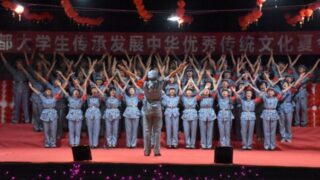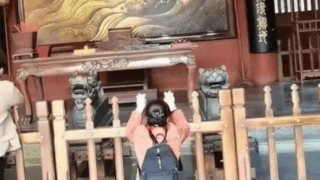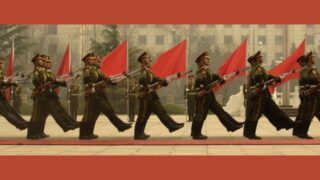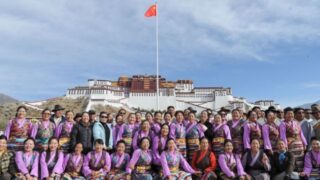Not understanding how democracy works, the CCP created itself an unprecedented anti-Chinese coalition in the West, outraged by its aggressive and arrogant behavior.
by Ruth Ingram


Beijing’s anti-western rhetoric is in danger of backfiring, following a wave of retaliatory sanctions against those who have dared to call out the atrocities in North West China as forced labor, crimes against humanity, and genocide.
The world must wake up to its foolish ways and examine its “erroneous practices,” according to a furious CCP lashing out in Cultural Revolution rhetorical style last week. These outbursts followed a swathe of sanctions from 30 European nations, Canada and the USA of individuals and entities directly involved in the oppression of Uyghur and Turkic minority peoples in North West China. Beijing let fly in retaliation with a perfect storm of retribution that netted a broad spectrum of researchers, politicians, lawyers, activists and organizations who have objected in one way or another to Beijing’s treatment of its Turkic Muslim minorities.
Issuing threats of more to come, if offenders refuse to see the error of their ways, apologize, and back down, the CCP labels former US Secretary of State Mike Pompeo and scholar Adrian Zenz, whose energy and commitment to exposing the atrocities are seen as the root cause of a plot to undermine China, as “The Evil Spirits” that seek nothing short of “plunging the world into chaos,” adding that “Pompeo’s and Zenz’s words and deeds make it clear that they are the hateful enemies of the people of all ethnic groups in Xinjiang.”
Beijing’s intentions to cow, terrify, and shame have had the opposite effect. Writing in The Diplomat, Andreea Brînză makes an interesting case that China’s fundamental misunderstanding of democracies causes it to consistently misstep in its attempts to influence them. Whilst on one hand banning entry to sanctioned China scholars, the impact of Beijing’s measures has been to rally world academics in pinning a badge of honor onto the CCP’s preys, and redoubling efforts to flag up victims of CCP brutality. Joanne Smith Finley from Newcastle, a China scholar and target of sanctions was swamped with well-wishing tweets from the world’s academics and her own university, and unanimous promises to stand with her in her efforts to raise the profile of the beleaguered group.
Boris Johnson, UK Prime Minister, who had been a closet China supporter and self-confessed “sinophile,” and who with his party had vehemently opposed the so-called Genocide Amendment to the Trade Bill, was featured gathered with his wounded flock of sanctioned MPs and added his own condemnation. “The MPs and other British citizens sanctioned by China today are performing a vital role shining a light on the gross human rights violations being perpetrated against Uyghur Muslims,” he said. “Freedom to speak out in opposition to abuse is fundamental and I stand firmly with them.”
The sanctions have achieved in a few short days what months and years of lobbying to bring political parties together to agree to unmask the tactics of Beijing had still not achieved.
Brînză also pointed out that the CCP, by singling out five MEPs for sanctions who represented each of the four main political groups in the European Parliament, had shot itself in the foot over the pending EU-China Comprehensive Agreement on Investment (CAI). The bilateral trade deal between Europe and Beijing had been ratified by Beijing and all but reciprocated by Europe. China, hoisted with its own petard, has set that agreement back significantly.
Caught up in the maelstrom are western fashion brands that have dared to challenge the CCP mantra that nothing untoward is going on in its cotton industry. Anti-Slavery International’s Business and Human Rights Manager, Chloe Cranston, has been rallying companies behind the scenes to sign up to anti-slavery business practices, in a “call to action” particularly in regard to forced labor coming out of Xinjiang. Suddenly threats by the Chinese government to sue the foremost researcher on forced labor in the region, Adrian Zenz, and to retaliate against companies that withdraw from the region have precipitated a call to rise up and be counted.
CCP threats have forced the hands of companies that had been sitting on the fence. Zara, Hugo Boss and Fila USA, to name but a few are already removing their policies on forced labor from their websites for fear of retaliation and are now unable to hide their stance from customers, but others such as H&M and Nike have stood their ground and face a vehement backlash in China. The irony of this groundswell which has involved Apple deleting all reference to H&M stores on Google Maps, shops closing and the brands disappearing from online retailers has not been lost on the China Digital Times in its own analysis of the furor. It pointed out that the social media “charge” within China was being cynically led by the Communist Youth League on Weibo whose inflammatory and unfounded accusations asserted the Swedish brand was “making up lies and boycotting Xinjiang cotton,” whilst still intent on profiting from Its Chinese business.
Amidst the nationalistically fueled rhetoric, Human Rights Watch’s Yaqiu Wang started to observe a pause for reflection amongst bloggers who pointed out that previously forbidden topics such as forced labor, Xinjiang and the Uyghur plight were suddenly getting an airing. “The sudden focus on Xinjiang stood in contrast with a years-long taboo on Chinese social media, which left some commenters mystified about why H&M might have concerns,” he said. “As someone who grew up in this heavily censored country, learning about prohibited issues was mostly an accident,” wrote one blogger. “I hope this Xinjiang cotton ‘storm’ is such a moment for many people in China, especially the youth.”
Other comments translated by the CDT questioned why such vehement patriots were more concerned with Xinjiang cotton than with its people. Many such posts were reported deleted, and accounts suspended for raising such questions.
It seems that Beijing’s outpourings and explosions of affront and hurt feelings have hurled the Uyghur issue into mainstream news once again, uniting politicians, academics and all those who care about justice for the people behind the politics, the debates, the vested interests, and yes, even the cotton.









